Which mobile operator provides the best service across Europe? This article evaluates the top carriers like Vodafone, Telefonica, Deutsche Telekom, and Orange based on factors such as coverage, speeds, pricing, customer satisfaction, and 5G leadership. By comparing the key strengths and weaknesses, we’ll uncover who delivers the most reliable and valuable mobile experience for customers throughout the European region.
Table of Contents
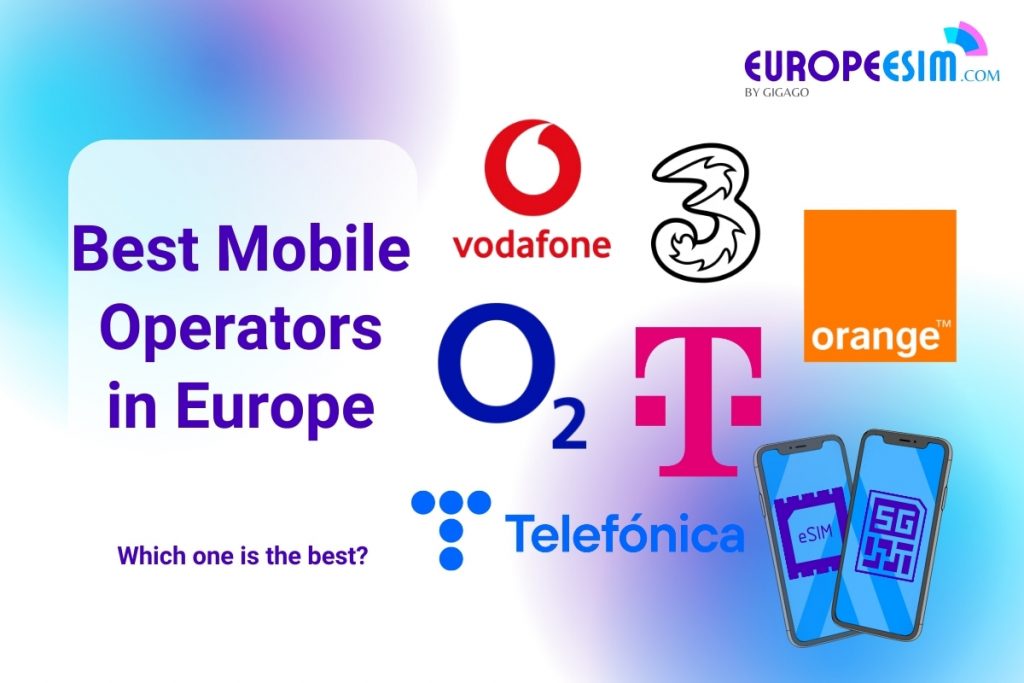
I. List of European mobile operators & MVNOs
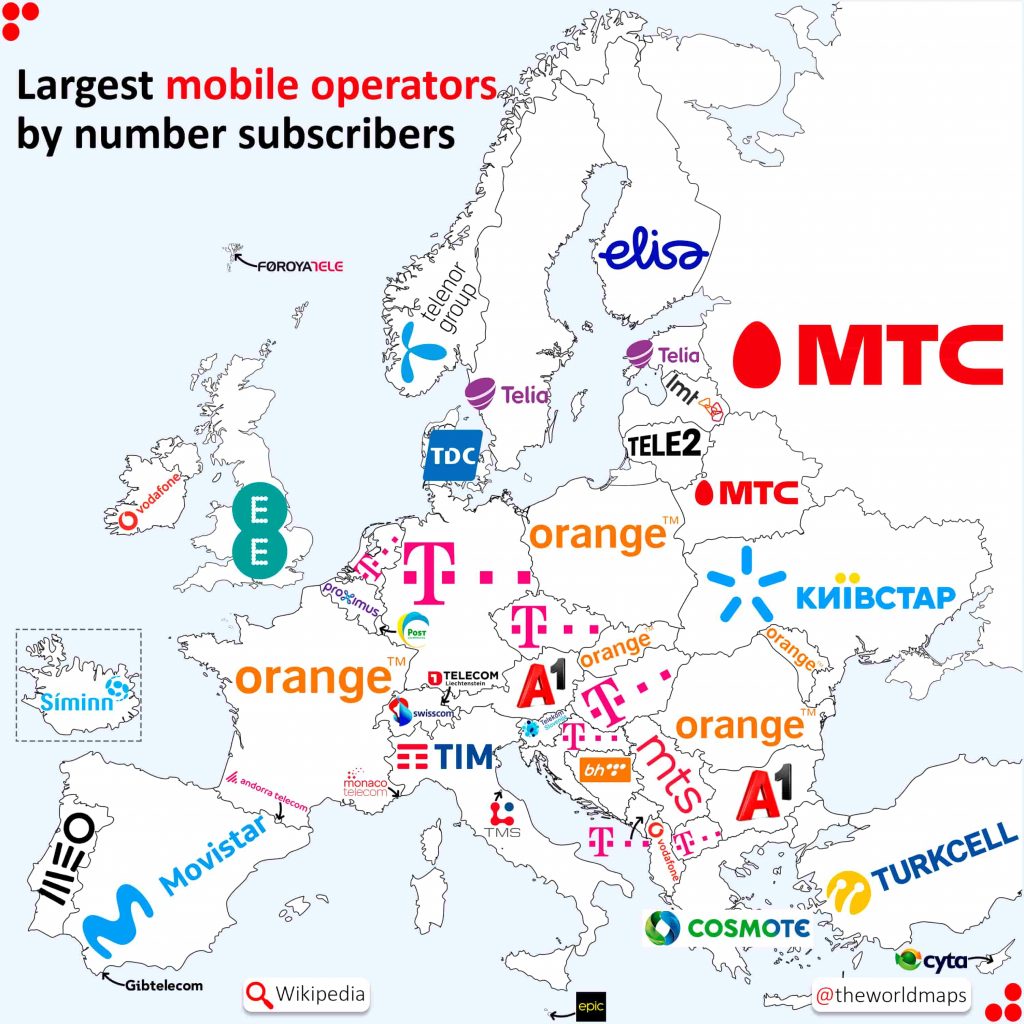
The list of European mobile operators is very long because each EU country has its own operators. However, some carriers are present in multiple countries like Vodafone, Orange, Three, T-Mobile, and Telefonica. Below are some popular operators in regions across Europe:
The list that follows details the primary European mobile operators and MVNOs, shedding light on physical network owners and companies utilizing third-party networks across the region.
1. Mobile operators in Western Europe
Some major operators in 9 Western European countries include:
- Austria: Drei (Three), A1, Magenta Telekom
- Belgium: Proximus, Orange, Base
- France: Orange, SFR, Bouygues Telecom, Free Mobile
- Germany: Telekom, Vodafone, O2 (Telefónica Deutschland)
- Liechtenstein: FL1, 7acht, Swisscom FL
- Luxembourg: Orange, Tango, POST
- Monaco: Monaco Telecom
- Netherlands: KPN, Vodafone, Odido
- Switzerland: Swisscom, Sunrise, Salt
Many mobile virtual network operators (MVNOs) use the networks of the major carriers. Some examples are Lycamobile, Lebara Mobile, and Giffgaff in the UK.
2. Mobile operators in Eastern Europe
Leading operators in 10 Eastern European countries like Poland, Czechia, Slovakia, Hungary, Romania, Bulgaria and more include:
- Belarus: MTS, A1, Life
- Bulgaria: A1, Yettel, Vivacom
- Czech Republic: T-Mobile, O2, Vodafone
- Hungary: Magyar Telekom, Vodafone, Yettel
- Moldova: Moldcell, Orange Moldova, Tele2 Moldova
- Poland: Orange Polska, Play, T-Mobile Polska, Plus
- Romania: Orange Romania, Vodafone Romania, Telekom Romania. Digi
- Russia: MTS, MegaFon, Beeline, Tele2 Russia
- Slovakia: Orange Slovensko, O2 Slovakia, 4ka, Slovak Telekom
- Ukraine: Vodafone Ukraine, Kyivstar, lifecell
3. Mobile operators in Southern Europe
The major operators in 15 Southern European countries like Italy, Greece, Croatia and more are:
- Albania: One Albania, Vodafone Albania
- Andorra: Andorra Telecom
- Bosnia and Herzegovina: BH Mobile, m:tel, HT ERONET
- Croatia: Hrvatski Telekom, A1, Telemach
- Greece: Cosmote, Vodafone Greece, NOVA (formerly WIND)
- Italy: TIM, Vodafone Italia, WindTre, Iliad, Fastweb
- Malta: GO, Melita, Epic
- Montenegro: M:tel, Crnogorski Telekom, One Montenegro
- North Macedonia: Makedonski Telekom, A1
- Portugal: MEO, Vodafone Portugal, NOS
- San Marino: TELECOM San Marino
- Serbia: mts, Yettel, A1
- Slovenia: Telekom Slovenije, A1 Slovenija, Telemach, T-2
- Spain: Telefónica Movistar, Vodafone Spain, Orange Spain, Yoigo
- Vatican: No available information
4. Mobile operators in Northern Europe
Prominent operators in 10 Northern European countries like Sweden, Norway, Denmark, Finland and more consist of:
- Denmark: TDC, Telenor, Telia
- Estonia: Elisa, Tele2, Telia
- Finland: Elisa, Telia, DNA
- Iceland: Siminn, Vodafone Iceland, Nova
- Ireland: eir, Vodafone Ireland, Three Ireland
- Latvia: LMT, Tele2
- Lithuania: Tele2, Bitė Lietuva, Telia Lietuva
- Norway: Telenor, Ice, Telia
- Sweden: Telia, Tele2, Telenor, Hi3G
- United Kingdom: EE, O2, Vodafone, Three
So in summary, the most ubiquitous European mobile operators spanning many country markets include Vodafone, Deutsche Telekom, Orange, Telefonica, and Telia Company based on their significant footprint and customer bases across the region. National providers also have strong positions in their respective domestic markets. Research to find the balance of network and offers for your needs.
II. Europe mobile operators – Which tourists should choose?
Choosing the right European mobile operator as a tourist in Europe can be tricky, but understanding some of the major players can help you make an informed decision. Here’s a quick breakdown of some popular options:
1. Vodafone

Vodafone has a significant presence in many European markets like the UK, Italy, Germany, Spain, Portugal and more. It is one of the largest mobile operators in Europe.
- Pros: Extensive network coverage across most of Europe, good internet speeds, variety of prepaid and postpaid plans.
- Cons: Can be expensive compared to some other options, customer service can be mixed.
2. Orange
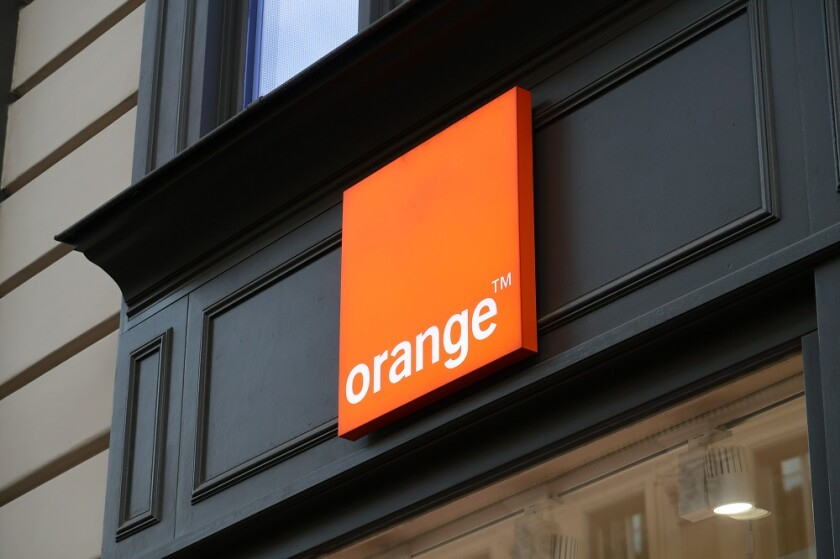
Orange has a widespread European footprint with operations in France, Spain, Poland, Romania and multiple other countries.
- Pros: Strong network in many European countries, offers tourist SIM cards with data, calls, and texts, reliable customer service.
- Cons: Plans can be pricier than some MVNOs, coverage is not as extensive as Vodafone in some areas.
3. Three
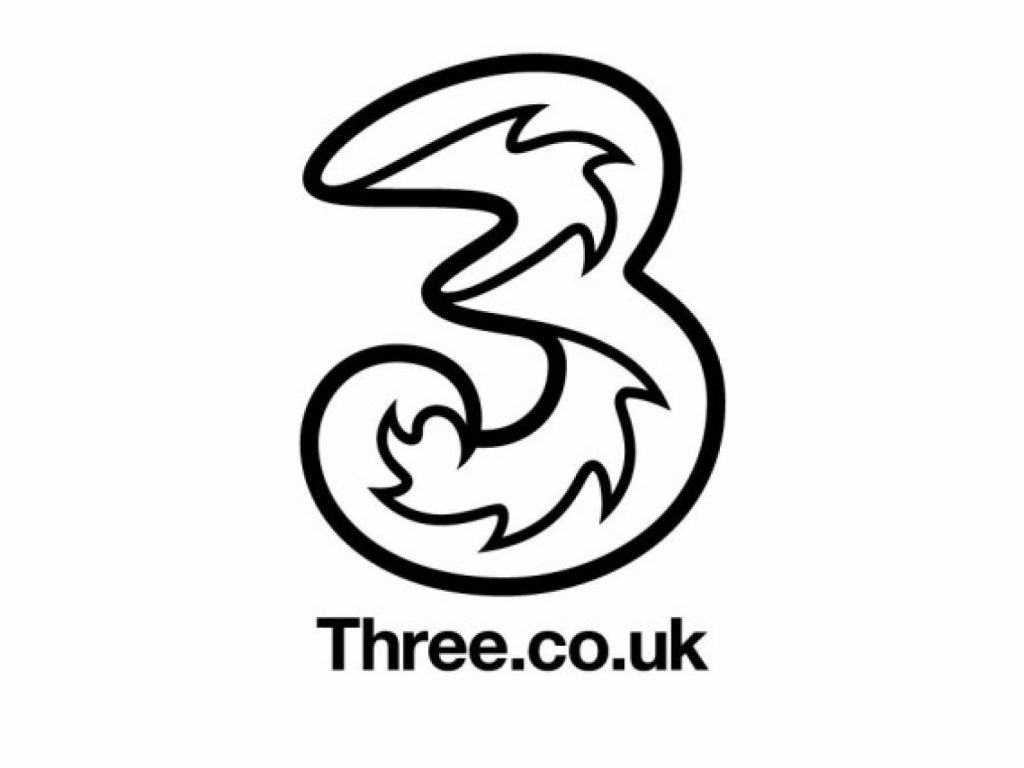
Three operates mobile networks in the UK, Ireland, and Italy under the Three brand. It provides competitive postpaid and prepaid offerings in these markets.
- Pros: Generally cheaper than major operators, offers data-heavy plans with good value, and often has promotions for new customers.
- Cons: Network coverage can be patchy in rural areas, and customer service can be slow at times.
4. T-mobile (Deutsche Telekom)

Deutsche Telekom operates mobile networks under the T-Mobile brand in key countries like Germany, the UK, the Netherlands, the Czech Republic, Croatia, Greece, and others.
- Pros: Excellent network in many European countries, offers “Free Roaming” within Europe for some Magenta plans (US customers only).
- Cons: Not available to all customers, limited selection of prepaid plans in Europe.
5. Telefónica (O2/Movistar/Vivo)
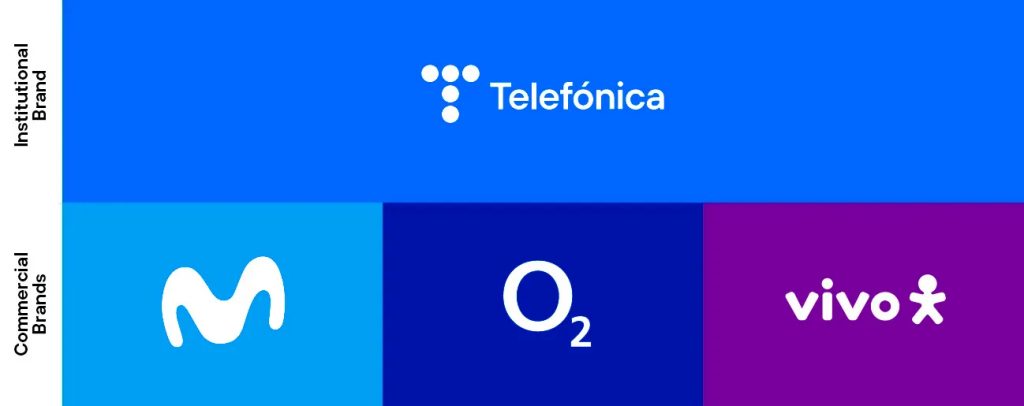
Telefonica (O2 brand) is a major operator in Spain and also has substantial businesses in Germany, the UK, and the Czech Republic.
- Pros: Good network coverage in the UK, Spain, and Germany, offers affordable prepaid plans with data, calls, and texts.
- Cons: Limited coverage in other parts of Europe, and customer service can be slow.
6. EE
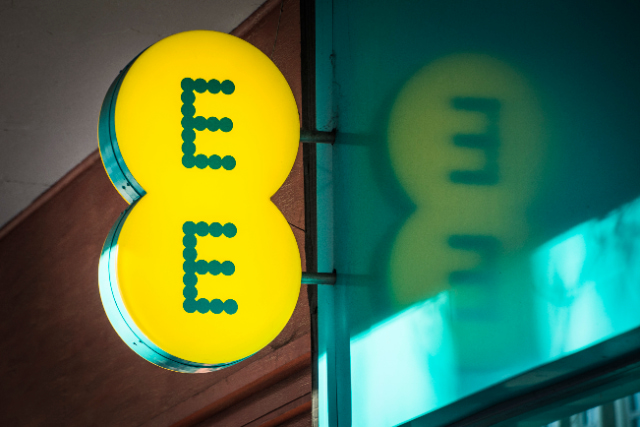
EE is a joint venture of BT Group in the UK, making it the largest mobile network in the country. It has a strong position in the UK market.
- Pros: Strong network in the UK, offers unlimited data plans with good speeds, good customer service.
- Cons: Expensive compared to other options, limited coverage outside the UK.
7. Lycamobile
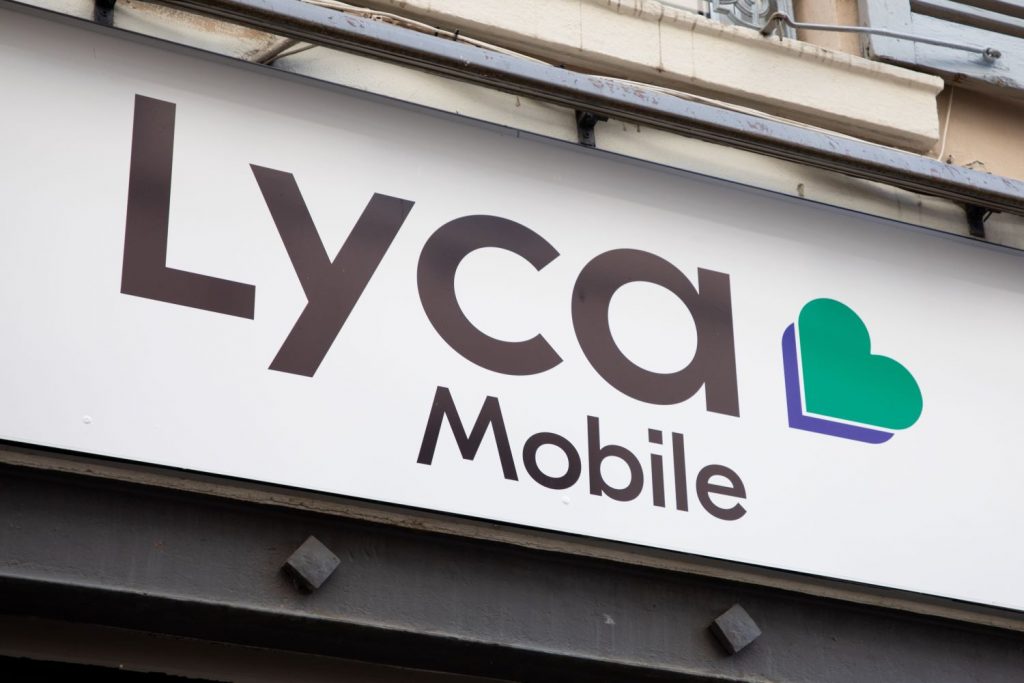
Lycamobile is an MVNO with a large customer base across Europe. It provides low-cost international calls and data on local networks.
- Pros: Very cheap calls and texts, especially to international destinations, often have special offers and promotions.
- Cons: Network coverage can be limited, data speeds can be slow, and customer service can be poor.
8. Lebara mobile

Similar to Lycamobile, Lebara is a prominent MVNO focused on serving international communities. It offers affordable prepaid plans riding on various European networks.
- Pros: Relatively cheap calls and texts, good value for international calls, easy to top up.
- Cons: Network coverage can be limited, data speeds can be slow, and customer service can be slow.
Bonus tip: If you're traveling to multiple countries, consider buying a prepaid SIM card from a local operator in each country. This can often be cheaper than roaming with your home network.
III. Best Europe mobile operators – Brief comparison
When comparing some of Europe’s top mobile operators across key parameters, here is an overview:
1. Speed:
- Download Speed: Overall, Vodafone and Deutsche Telekom often lead with the fastest download speeds, followed by Orange and Three. T-Mobile can lag slightly depending on location.
- Upload Speed: Similar to download speeds, but the margins might be closer between operators. Three can shine in some areas.
2. Video Experience:
- General Video: Vodafone and Deutsche Telekom typically offer the smoothest general video streaming due to their high speeds and consistent quality.
- Live Video: Live video streaming can be demanding, requiring both high download and upload speeds. Vodafone and Deutsche Telekom remain strong contenders, but Orange and Three can perform well if their networks are not congested.
3. Games Experience:
- Fast-paced Games: Reliable low latency is crucial for competitive online gaming. Deutsche Telekom and Vodafone generally boast the lowest latencies, but it might vary based on specific games and server locations.
- Casual Games: For casual mobile gaming, any of the operators can provide a good experience as long as you have decent speed and consistent quality.
4. Voice App Experience:
- Call Quality: All major operators typically offer clear call quality in most areas. Voice over IP (VoIP) apps like WhatsApp or Skype might occasionally experience quality fluctuations depending on network congestion.
- Video Calling: Similar to live video streaming, high upload speeds are important for smooth video calls. Vodafone and Deutsche Telekom might have a slight edge.
5. Coverage:
- Urban Areas: All major operators have excellent coverage in most major cities and tourist destinations.
- Rural Areas: Deutsche Telekom and Vodafone generally have the most extensive rural coverage, followed by Orange and then Three.
6. Consistency in Quality:
All European mobile operators strive for consistent quality, but network congestion and infrastructure differences can occasionally lead to variations. Deutsche Telekom and Vodafone tend to be the most reliable across different regions.
7. Plans for Tourists:
- Prepaid SIM Cards: All operators offer prepaid SIM cards with various data packages tailored for tourists. Orange Holiday Europe, T-Mobile Go5G & Magenta & Magenta MAX, and Three PAYG/Go Roam are popular options with decent data, calls, and text allowances.
- Short-term Contracts: Some operators offer temporary contracts for tourists with attractive rates. Consider exploring options on the respective operator websites.
Final Thoughts:
Choosing the "best" operator depends heavily on your priorities and travel plans. If speed and consistency are paramount, consider Vodafone or Deutsche Telekom. For budget-conscious travelers, Three or Orange prepaid plans might be suitable. Those venturing into rural areas might favor Deutsche Telekom's extensive coverage. Ultimately, research specific plans and coverage maps based on your destinations and compare prices before making a decision.
IV. Do mobile network carriers in Europe support eSIM?
Yes, eSIM technology is widely supported by major mobile network carriers in Europe, making it a convenient option for travelers and locals alike. Here’s a breakdown:
- Vodafone: Offers eSIM in most European countries, including popular tourist destinations like Spain, Italy, France, and the UK.
- Orange: Supports eSIM in many European countries, with strong coverage in France, Spain, and Central Europe.
- Deutsche Telekom (T-Mobile): Provides eSIM in Germany and several other European countries.
- Telefonica (O2, Movistar): Offers eSIM in Spain, Germany, and other countries through its various brands.
- Three: Supports eSIM in many European countries, known for its budget-friendly plans
Overall, eSIM is a great option for mobile phone users in Europe, offering convenience, flexibility, and security. With major carriers increasingly adopting the technology, travelers and locals alike can enjoy its benefits.
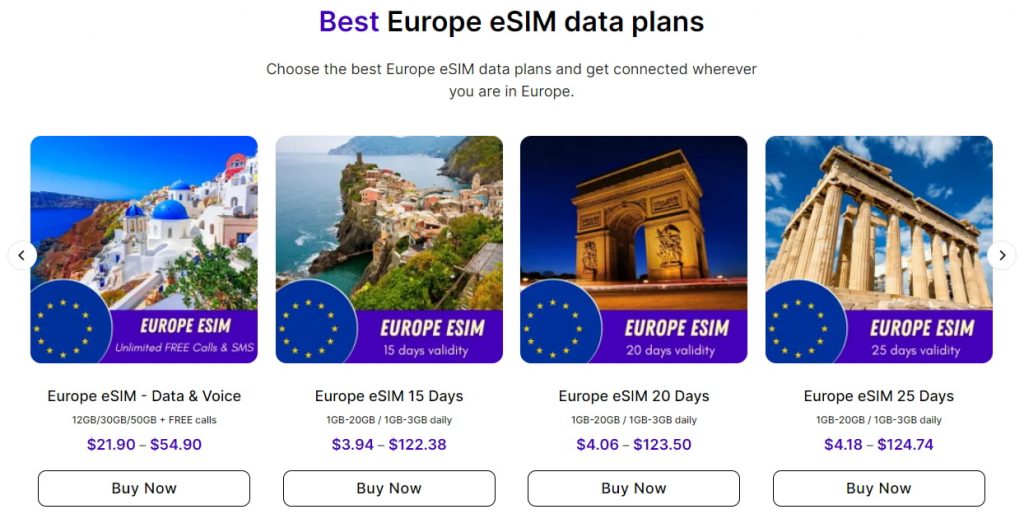
Travel across Europe with fast, affordable data through eSIM. No need to swap SIM cards – just scan and go online. Plans start from only $5 for 3 days. Buy yours today at europe-esim.com and stay connected wherever your travels take you.
V. FAQs
Q: Which is better – getting a local SIM/eSIM vs. roaming on my home network abroad?
A: Getting a local Europe SIM card/Europe eSIM usually works out cheaper than roaming for long trips. Also, data speeds/coverage may be better on-ground.
Q: Can I use 4G/5G data with European tourist SIM cards?
A: Yes, most Europe tourist SIMs provide high-speed data on 3G/4G/5G networks with top operators through roaming.
Q: How much data is adequate on a Europe trip for a week?
A: For a 1 week Europe trip, around 2 – 5 GB of data should suffice based on your usage for GPS, social media, calls, etc.
Q: Do European tourist SIMs work across all Schengen zone countries?
A: The best tourist SIMs for Europe provide seamless roaming across 30+ Schengen countries with a single card through roaming partnerships.
VI. Final words
When selecting mobile connectivity across Europe, tourists need to assess data requirements, countries being visited, and ease of access when choosing international roaming packages or local SIMs.
Leading Europe mobile operators like Vodafone and Orange provide excellent coverage spanning multiple European footprints along with great speeds and a reliable experience. Their tourist data plans also offer convenience and affordability.











